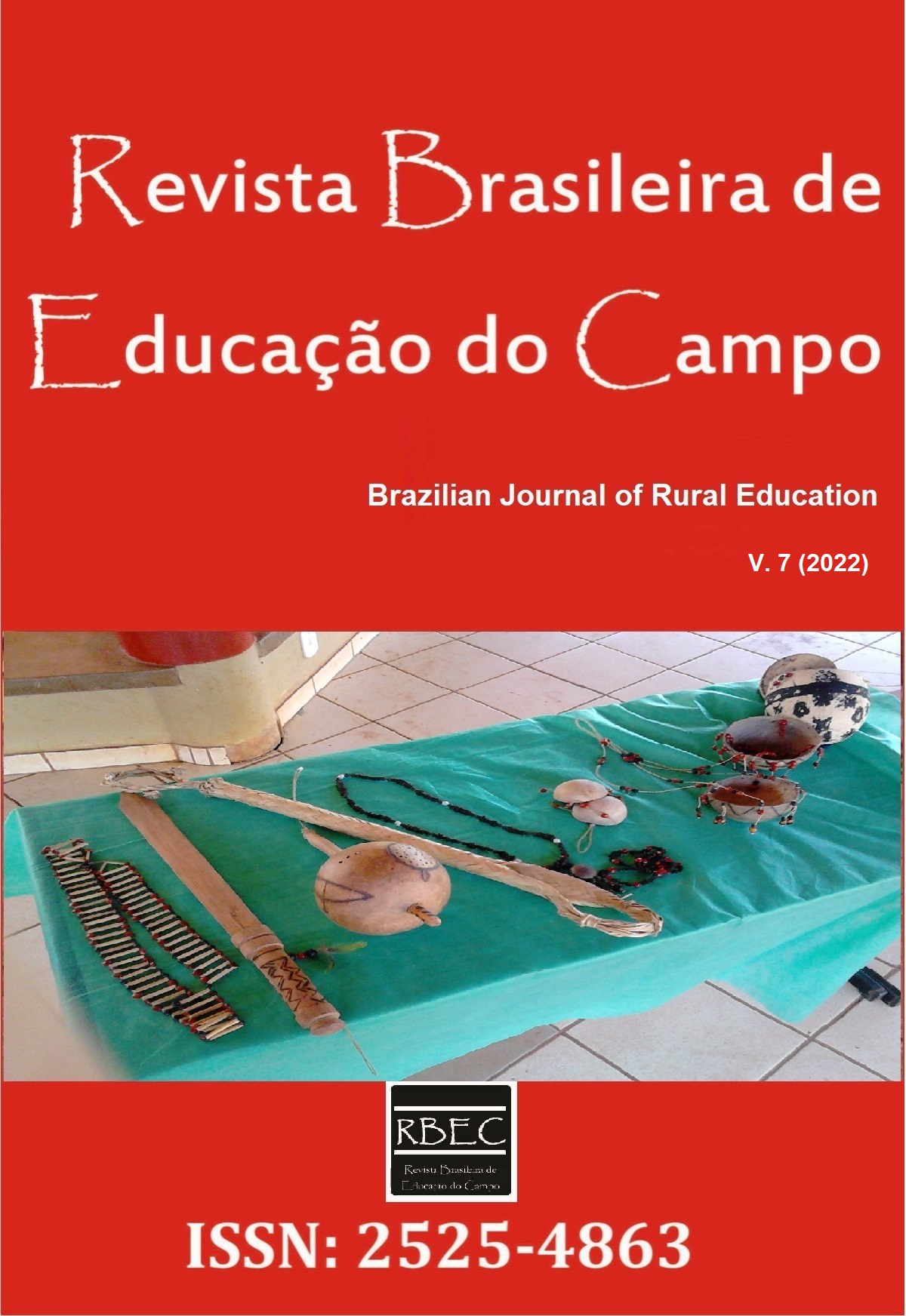Agricultural Family School: Transforming Education Proposals
DOI :
https://doi.org/10.20873/uft.rbec.e13730Résumé
ABSTRACT. This study is part of the Master’s degree dissertation of the Postgraduate Program in Science Teaching and Humanities, at the Federal University of Amazonas. The main objective of this research is to rebuild the proposal of the Agricultural Family School and Pedagogy of Alternation historically, in the French and Brazilian contexts, and it brings as an example its history at Guaporé Valley in Rondônia. The first experience of the Agricultural Family School took place in France (1935). In Brazil, the Agricultural Family School has origins in the Movement of Promotional Education Espírito Santo - MPEES. The Agricultural Family School, in Brazil, takes place through several initiatives that are influenced, specially, by the Basic Ecclesiastical Communities - BECs, linked to the Catholic Church, to the labor union movement of rural workers, carrying concepts from Paulo Freire’s theory, such as the desire to transform the reality in which we live in. The partial results of the research emphasize how much the Pedagogy of Alternation at Guaporé Valley was elaborated by local the rural people and it was concretized into a transformative education, in a region marked by the profit and exploitation of the western Amazon.
Téléchargements
Références
Brandão, C. R. (2017). O que é educação popular. Brasiliense.
Begnami, J. B. (2019). Formação por Alternância na Licenciatura em Educação do Campo: possibilidades e limites do diálogo com a Pedagogia da Alternância (Doutorado em Educação). Universidade Federal de Minas Gerais, Belo Horizonte. https://doi.org/10.47930/1980-685X.2020.0601
Castelhano, J. N. F. M. (2017). O método de Cardijn: Ver, Julgar e Agir a sua vivência e aplicação na Acção Católica Rural (Mestrado Integrado em Teologia). Universidade Católica Portuguesa, Lisboa.
Chauí, M., & Nogueira, M. A. (2007). O pensamento político e a redemocratização do brasil. Revista Lua Nova, 71, 173-228. https://doi.org/10.1590/S0102-64452007000200006
Estatuto. (2016). Estatuto da Associação da Escola Família Agrícola Vale do Guaporé.
Granerau, A. (2020). O Livro de Lauzun onde começou a pedagogia da alternância. Tradução de Antonio João Mânfio, José Eustáquio Romão, Ático Fassini, Thierry De Burghgrave. - Fortaleza: Edições UFC.
Gimonet, J.-C. (2007). Praticar e compreender a pedagogia da alternância dos CEFFAs. Editora Vozes.
Lunas, A. C. (2021). Entrevista. [jul.] Entrevistador: Diana da Silva Ribeiro. São Francisco do Guaporé. 1 arquivo mp4. (1h 31:15).
Lopes, A. L. L., & Pertile, C. A. (2022). O método ver-julgar-agir: genealogia e sua relação com a teologia da libertação. Revista Razão e Fé, 22(2), 33-43.
Morin, E. (2005). Ciência com consciência. 8. ed. Rio de Janeiro: Bertrand.
Nosella, P. (2014). Educação no campo: origens da pedagogia da alternância no Brasil.
Vitória: EDUFES, (Educação do campo. Diálogos interculturais).
Porto Aires, H. Q., Vizolli, I., & Stephani, A. D. (2018). A prática da pedagogia da alternância na Escola Família Agrícola de Porto Nacional no Estado do Tocantins. Revista Perspectiva, 36(1), 244-268. https://doi.org/10.5007/2175-795X.2018v36n1p244
Rodrigues, A. C. S., & et al. (2017). Nucleação de Escolas do Campo: Conflitos entre formação e desenraizamento. Educação & Realidade, 42(2), 707-728. https://doi.org/10.1590/2175-623657687
Sobreira, M. F. C., & Silva. L. H. (2014). Vida e construção do conhecimento na Pedagogia da Alternância. Revista Eletrônica de Educação, 8(2), 212-227. https://doi.org/10.14244/19827199915
Zamberlan, S. (2021). Roda de Conversa com Encontro de Formação das famílias: o papel das famílias na Pedagogia da Alternância das EFAs - realidade, desafios e possibilidades. In Seminário Nacional da Pedagogia da Alternância das Escolas Famílias Agrícolas (EFAs). UNEFAB.
Téléchargements
Publié-e
Comment citer
Numéro
Rubrique
Licence
© Eulina Maria Leite Nogueira, Diana da Silva Ribeiro 2022

Cette œuvre est sous licence Creative Commons Attribution 4.0 International.
Proposal for Copyright Notice Creative Commons
1. Policy Proposal to Open Access Journals
Authors who publish with this journal agree to the following terms:
A. Authors retain copyright and grant the journal right of first publication with the work simultaneously licensed under the Creative Commons Attribution License that allows sharing the work with recognition of its initial publication in this journal.
B. Authors are able to take on additional contracts separately, non-exclusive distribution of the version of the paper published in this journal (ex .: publish in institutional repository or as a book), with an acknowledgment of its initial publication in this journal.
C. Authors are permitted and encouraged to post their work online (eg .: in institutional repositories or on their website) at any point before or during the editorial process, as it can lead to productive exchanges, as well as increase the impact and the citation of published work (See the Effect of Open Access).














